Related Research Articles

Li Bai, formerly pronounced Li Bo, courtesy name Taibai (太白), was a Chinese poet acclaimed as one of the greatest and most important poets of the Tang dynasty and in Chinese history as a whole. He and his friend Du Fu (712–770) were two of the most prominent figures in the flourishing of Chinese poetry under the Tang dynasty, which is often called the "Golden Age of Chinese Poetry". The expression "Three Wonders" denotes Li Bai's poetry, Pei Min's swordplay, and Zhang Xu's calligraphy.
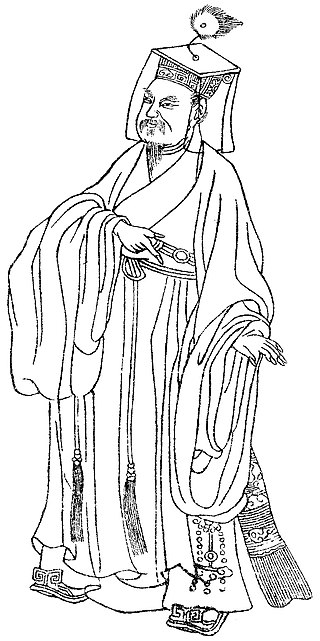
Han Yu, courtesy name Tuizhi, and commonly known by his posthumous name Han Wengong (韓文公), was an essayist, Confucian scholar, poet, and government official during the Tang dynasty who significantly influenced the development of Neo-Confucianism. Described as "comparable in stature to Dante, Shakespeare or Goethe" for his influence on the Chinese literary tradition, Han Yu stood for strong central authority in politics and orthodoxy in cultural matters.
Cí, also known as chángduǎnjù and shīyú, is a type of lyric poetry in the tradition of Classical Chinese poetry that also draws upon folk traditions. Cí, also known as "song lyrics," use various poetic meters derived from a base set of fixed pattern forms, using fixed-rhythm, fixed-tone, and line-lengths varying according that of the model examples. The rhythmic and tonal pattern of the cí are based upon certain, definitive musical song tunes (cípái), and in many cases the name of the musical tune is given in the title of a cí piece, in a form such as "after ...."

Tang poetry refers to poetry written in or around the time of or in the characteristic style of China's Tang dynasty, and/or follows a certain style, often considered as the Golden Age of Chinese poetry. The Complete Tang Poems includes over 48,900 poems written by over 2,200 authors. During the Tang dynasty, poetry continued to be an important part of social life at all levels of society. Scholars were required to master poetry for the civil service exams, but the art was theoretically available to everyone. This led to a large record of poetry and poets, a partial record of which survives today. The two most famous poets of the period were Li Bai and Du Fu. The Qing dynasty selection, Three Hundred Tang Poems, has made Tang poetry familiar to educated Chinese in modern times.
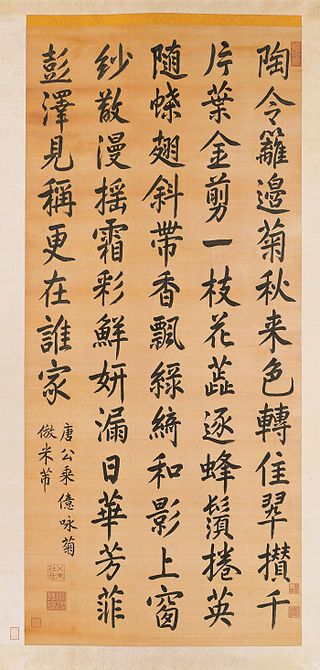
Complete Tang Poems is the largest collection of Tang poetry, containing some 49,000 lyric poems by more than twenty-two hundred poets. In 1705, it was commissioned at the direction of the Qing dynasty Kangxi Emperor and published under his name. The Complete Tang Poems is the major reservoir of surviving Tang dynasty poems, from which the pre-eminent shorter anthology, Three Hundred Tang Poems, is largely drawn.
Achilles Chih-t'ung Fang was a Chinese scholar, translator, and educator, best known for his contributions to Chinese literature and comparative literature. Fang was born in Japanese-occupied Korea, but attended university in mainland China. After completing his undergraduate degree, Fang worked for Monumenta Serica, a prominent scholarly journal of Chinese topics. He then moved to the United States, where he took up residency in Cambridge, Massachusetts, studying and teaching courses at Harvard University.
Meng Jiao (751–814) was a Chinese poet during the Tang dynasty. Two of his poems have been collected in the popular anthology Three Hundred Tang Poems. Meng was the oldest of the Mid-Tang poets and is noted for the unusual forcefulness and harshness of his poems.
Song poetry refers to Classical Chinese poetry of or typical of the Song dynasty of China, established by the Zhao family in China in 960 and lasted until 1279.
Wilt L. Idema is a Dutch scholar and Sinologist who taught at University of Leiden and Harvard University (2000–13), presently emeritus at both universities. He specializes in Chinese literature, with interests in early Chinese drama, Chinese women's literature of the premodern period, Chinese popular narrative ballads, and early development of Chinese vernacular fiction.

Kang-i Sun Chang, is a Taiwanese American sinologist. She is a scholar of classical Chinese literature. She is the inaugural Malcolm G. Chace Professor, and former chair of the Department of East Asian Languages and Literatures at Yale University.

This is a timeline of the Karluks. The Kara-Khanid Khanate is also included; however, it is disputed whether the Karluks or Yagmas were the dominant group within the khanate.

This is a timeline of the Five Dynasties and Ten Kingdoms (907–979), which followed the collapse of the Tang dynasty in 907 AD. The Five Dynasties refer to the succession of dynasties which ruled northern China following the Tang collapse while the Ten Kingdoms, with the exception of Northern Han, ruled in southern China. This era of division ended in 979 AD with the rise of the Song dynasty under Emperor Taizu of Song, although the Song would never reconquer the northern territory lost to the Khitans, collectively known as the Sixteen Prefectures.
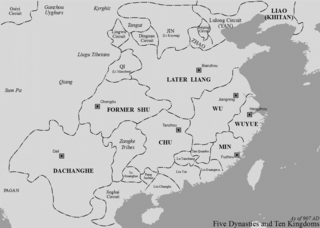
This is a timeline of the Tangut people and the Western Xia dynasty.
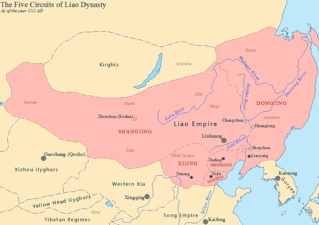
This is a timeline of Mongols prior to the Mongol Empire.
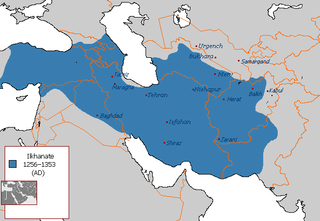
This is a timeline of the Ilkhanate.

This is a timeline of the Chagatai Khanate (1226–1348) and its successor states, Moghulistan (1347–1462), Yarkent Khanate (1514–1696), and the Turpan Khanate (1462–1680).
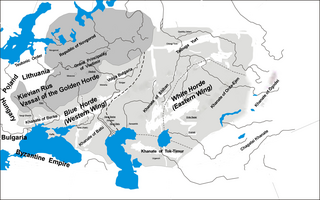
This is a timeline of events involving the Golden Horde (1242–1502), from 1459 also known as the Great Horde.

This is a timeline of the Xinjiang under the rule of the Qing dynasty.

This is a timeline of the Era of Fragmentation, the period of Tibetan history lasting from the death of the Tibetan Empire's last emperor, Langdarma, in 842 until Drogön Chögyal Phagpa gained control over the three provinces of Tibet in 1253 under Mongol rule.
Martin Kern is a German-American sinologist. After receiving his Ph.D. from the University of Cologne, Kern taught briefly at the University of Washington and Columbia University before accepting an assistant professorship at Princeton in 2000, before receiving a full professorship five years later. He specializes in Chinese literature, poetry, literary thought, philology, and historiography. He has served as the co-editor of the sinology journal T'oung Pao since 2009. He was awarded a Guggenheim Fellowship in 2018 for a monograph project on early Chinese poetry. He served as the president of the American Oriental Society in 2023–2024.
References
- ↑ "Stephen Owen". ealc.fas.harvard.edu. Archived from the original on April 4, 2023. Retrieved 2024-01-12.
- ↑ Guggenheim Foundation Fellowships Archived 2011-06-22 at the Wayback Machine
- 1 2 Vita: Stephen Owen
- ↑ "Translating nine pounds of poetry". Harvard Gazette . 11 April 2016.
- ↑ Shaw, Jonathan (April 12, 2016). "The Complete Works of Du Fu, China's Shakespeare, Published in English". Harvard Magazine . Retrieved January 12, 2024.
- ↑ "Tang Prize | Laureates". www.tang-prize.org. Retrieved 2023-10-05.
- ↑ "Tang Prize | Laureates | Stephen Owen". www.tang-prize.org. Retrieved 2024-01-12.
- ↑ "Stephen Owen ('68, Ph.D '72) has been awarded the prestigious Tang Prize for lifetime contributions to Sinology | East Asian Languages and Literatures". eall.yale.edu. Retrieved 2024-01-12.
- ↑ "Anthologizing" Harvard Magazine
- ↑ Harvard Journal of Asiatic Studies 36 (1976): 294-297. JSTOR
- ↑ David McCraw. "The Making of Early Chinese Classical Poetry (review)." China Review International 14.2 (2007): 355-359. Project MUSE. Web. 16 Apr. 2013.